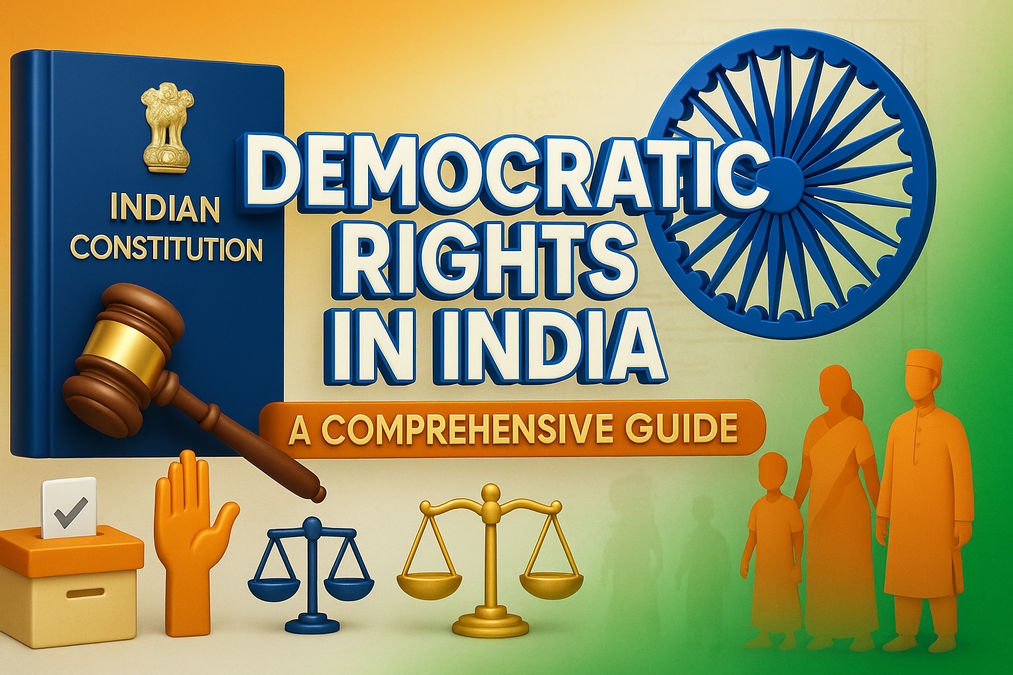Democratic Rights in India: A Comprehensive Guide

Democratic Rights in India: A Comprehensive Guide
Democratic rights in India form the backbone of the country's democratic framework, ensuring that every citizen enjoys freedom, equality, and justice. This guide explores the Fundamental Rights enshrined in the Indian Constitution, their significance, and how they protect citizens from injustice.
"Rights are not just privileges; they are guarantees that empower every citizen to live with dignity." - Dr. B.R. Ambedkar
What Are Democratic Rights in India?
Democratic rights in India refer to the Fundamental Rights guaranteed by the Constitution, which protect citizens from arbitrary state actions and ensure equality and freedom. These rights include the Right to Equality, Right to Freedom, Right against Exploitation, Right to Freedom of Religion, Cultural and Educational Rights, and the Right to Constitutional Remedies.
Timeline of Democratic Rights in India
1950: Adoption of the Constitution
The Indian Constitution came into effect, enshrining six Fundamental Rights for all citizens.
1978: Right to Property Removed
The Right to Property was removed as a Fundamental Right but remains a constitutional right.
2002: Right to Education
The 86th Amendment made education a Fundamental Right for children aged 6-14 years.
2005: Right to Information Act
The RTI Act empowered citizens to seek information from government offices, derived from the Right to Freedom.
Fundamental Rights at a Glance
| Fundamental Right | Description |
|---|---|
| Right to Equality | Ensures equality before the law and prohibits discrimination based on religion, race, caste, sex, or place of birth. |
| Right to Freedom | Includes freedom of speech, assembly, movement, residence, and profession. |
| Right against Exploitation | Prohibits human trafficking, forced labor, and child labor. |
| Right to Freedom of Religion | Allows individuals to profess, practice, and propagate their religion. |
| Cultural and Educational Rights | Protects the rights of minorities to conserve their culture and establish educational institutions. |
| Right to Constitutional Remedies | Allows citizens to approach courts to enforce their rights. |
Why Are Democratic Rights Important?
Democratic rights are essential for the sustenance of democracy. They protect minorities from majority oppression, ensure fair elections, and allow citizens to express their opinions freely. For example, the Right to Equality ensures that no one, from the Prime Minister to a farmer, is above the law.
"Without rights, democracy is just a hollow promise." - Anonymous
Real-Life Examples of Rights Violations
Guantanamo Bay
Prisoners were detained without trial, highlighting the absence of the Right to Freedom and Constitutional Remedies.
Saudi Arabia
Restrictions on women and lack of political freedoms show the denial of the Right to Equality and Freedom.
Kosovo Massacre
Ethnic Albanians faced violence, underscoring the need for Cultural and Educational Rights.
How Can Citizens Enforce Their Rights?
Citizens can approach the Supreme Court or High Courts through the Right to Constitutional Remedies. Public Interest Litigation (PIL) allows anyone to seek justice for public issues. The National Human Rights Commission (NHRC) also investigates violations and recommends actions.
Frequently Asked Questions
What are democratic rights in India?
Democratic rights in India are the Fundamental Rights guaranteed by the Constitution, such as the Right to Equality, Freedom, and Protection against Exploitation.
Why are Fundamental Rights important?
Fundamental Rights protect citizens from arbitrary state actions, ensure equality, and promote individual dignity and freedom.
How can citizens enforce their rights?
Citizens can approach the Supreme Court or High Courts through the Right to Constitutional Remedies or file Public Interest Litigation (PIL).
What is the Right to Equality?
The Right to Equality ensures that all citizens are equal before the law and prohibits discrimination based on religion, race, caste, sex, or place of birth.
What is untouchability, and is it banned in India?
Untouchability is a social practice that discriminates against certain castes. It is banned under Article 17 of the Indian Constitution.
Can the government restrict Fundamental Rights?
Yes, the government can impose reasonable restrictions in the interest of public order, security, or morality, as specified in the Constitution.
What is the National Human Rights Commission (NHRC)?
The NHRC is an independent body established in 1993 to investigate human rights violations and recommend actions to the government.
What is Public Interest Litigation (PIL)?
PIL allows any citizen to approach courts for issues of public interest, ensuring the protection of Fundamental Rights.
Are Fundamental Rights only for adults?
No, many Fundamental Rights, like the Right to Education, apply to children as well.
What is the Right to Freedom of Religion?
It allows individuals to profess, practice, and propagate their religion, subject to public order and morality.
Conclusion
Democratic rights in India empower citizens to live with dignity, equality, and freedom. By understanding and exercising these rights, we can strengthen our democracy and ensure justice for all.
Join the conversation